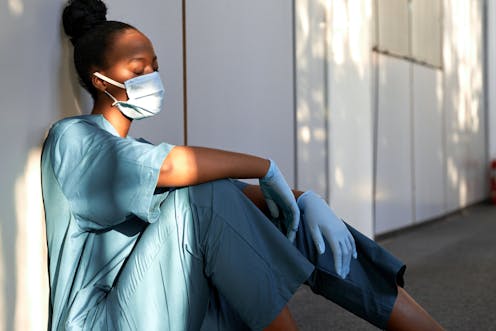6 ways to prevent a mass exodus of health workers
- Written by Sara Holton, Senior Research Fellow, Deakin University

Most Australians are counting down to a festive season with newfound freedom surrounded by family and friends.
Meanwhile, front-line health workers are bracing[1] for a potential summer surge[2] in COVID cases and hospitalisations.
They’re also concerned about the potential impact of the new Omicron variant[3].
A summer surge would put even more pressure on health workers who, as our research shows[4], are already experiencing high levels of distress.
While the bulk of the responsibility for addressing the well-being of clinical staff falls on health services and governments, we can all do our bit to prevent a mass health worker exodus.
What did our study find?
Health workers often experience high levels of stress as a result of working long hours or shift work, providing emotional support to patients and their families, and patient deaths. The pandemic has increased this stress.
We surveyed almost 3,700 health workers including nurses, midwives, doctors and allied health staff such as social workers, physiotherapists and occupational therapists in Australia and Denmark.
We found COVID negatively affected[5] health workers’ psychological well-being[6] and personal lives[7], despite the relatively lower numbers of cases and deaths in Australia compared with other countries.
About a quarter of those we surveyed reported symptoms of psychological distress[8], including depression, anxiety and stress.
Their main concerns[9] were contracting the virus, putting family members at risk and caring for infected patients.
We also found:
three-quarters of health workers agreed with the statement “people close to me have been concerned about my health”
almost one-quarter of respondents avoided telling people they worked at a health service. Several reported receiving a negative reaction when they wore their uniform in public
pregnant staff were concerned about the potential impact of COVID on themselves and their baby
wearing personal protective equipment (PPE) was challenging and resulted in headaches and dehydration
health workers had difficulties managing their paid work and family responsibilities, including supporting children with remote learning.
Read more: Here's the proof we need. Many more health workers than we ever thought are catching COVID-19 on the job[10]
Employees who thought their health service had responded appropriately to the pandemic and provided sufficient staff support had better mental health[11] than those who didn’t.
This suggests investing resources in support initiatives helps protect health worker well-being, and health services to assist and retain staff.
Without adequate support, the safe, high-quality care we rely on could be eroded by a mass job exodus[12], rising rates of absenteeism[13], and reduced quality of patient care.
What can we do to help?
We all have a role to play in protecting the well-being of this crucial workforce and ensuring the sustainability of health services.
Government and health services urgently need to:
1) implement best practice mental health and well-being initiatives for health workers. A range of initiatives[15] have been implemented during the pandemic, but if they don’t meet the needs of health workers, they’re unlikely to be used or successful. New models of support need to be co-designed with health workers and tested[16] so we know what works
2) build an ongoing system to monitor health worker mental health and well-being. Most data collected about health worker well-being during the pandemic is from single-site studies[17] of a fixed point in time. Large, ongoing studies can help us track health worker well-being and any changes over time, including the long-term impact of the pandemic
3) encourage health workers to access support[18] when needed.
Read more: High rates of COVID-19 burnout could lead to shortage of health-care workers[19]
The public can also play a role by:
4) getting vaccinated, including your booster, when eligible. And following the public health guidelines in your area. High vaccination rates help reduce the risk of new variants emerging[20] and protect us if they do emerge. A booster dose will give you stronger and longer lasting protection[21] against COVID
5) using 000 and hospital emergency departments only for medical emergencies. If the situation isn’t urgent contact your GP, local pharmacist or Health Direct[22] on 1800 022 222 (or Nurse-On-Call[23] in Victoria on 1300 60 60 24)
6) being kind and respectful to health workers, who have experienced higher levels of aggression and abuse than normal[24] during the pandemic. Health workers should feel safe at work.
References
- ^ health workers are bracing (www.theage.com.au)
- ^ surge (www.burnet.edu.au)
- ^ Omicron variant (www.theage.com.au)
- ^ our research shows (www.collegianjournal.com)
- ^ negatively affected (www.collegianjournal.com)
- ^ psychological well-being (www.publish.csiro.au)
- ^ personal lives (www.publish.csiro.au)
- ^ symptoms of psychological distress (www.publish.csiro.au)
- ^ concerns (www.publish.csiro.au)
- ^ Here's the proof we need. Many more health workers than we ever thought are catching COVID-19 on the job (theconversation.com)
- ^ better mental health (www.publish.csiro.au)
- ^ mass job exodus (www.theage.com.au)
- ^ rising rates of absenteeism (www.acn.edu.au)
- ^ Shutterstock (www.shutterstock.com)
- ^ initiatives (www.ncbi.nlm.nih.gov)
- ^ tested (pubmed.ncbi.nlm.nih.gov)
- ^ studies (www.ncbi.nlm.nih.gov)
- ^ support (www.bettersafercare.vic.gov.au)
- ^ High rates of COVID-19 burnout could lead to shortage of health-care workers (theconversation.com)
- ^ help reduce the risk of new variants emerging (theconversation.com)
- ^ stronger and longer lasting protection (www.health.gov.au)
- ^ Health Direct (www.healthdirect.gov.au)
- ^ Nurse-On-Call (www.betterhealth.vic.gov.au)
- ^ higher levels of aggression and abuse than normal (www.acn.edu.au)
Read more https://theconversation.com/6-ways-to-prevent-a-mass-exodus-of-health-workers-172509

















